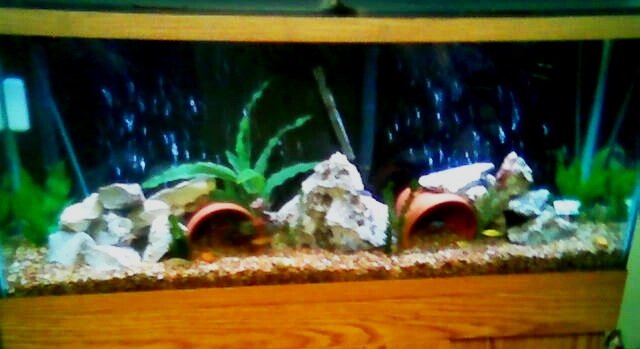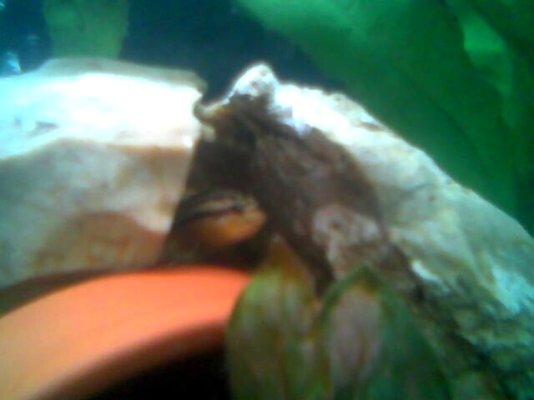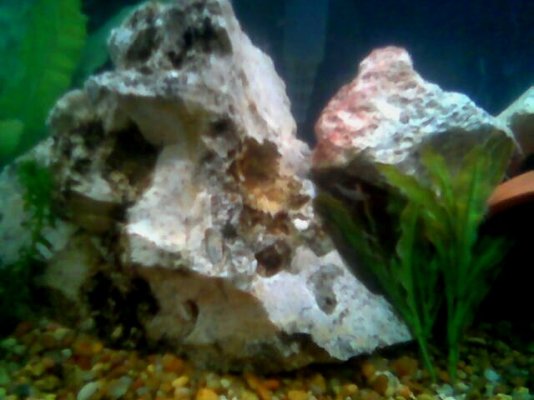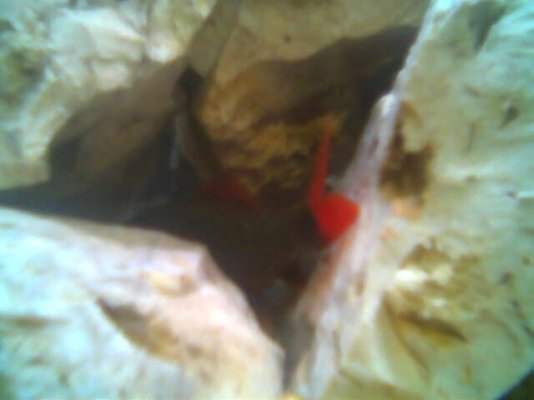You are using an out of date browser. It may not display this or other websites correctly.
You should upgrade or use an alternative browser.
You should upgrade or use an alternative browser.
Cleaning a rock
- Thread starter cd5
- Start date
The friendliest place on the web for anyone with an interest in aquariums or fish keeping!
If you have answers, please help by responding to the unanswered posts.
If you have answers, please help by responding to the unanswered posts.
You need to make sure the rock is ok to use in the tank. Even if it's clean you may not want to put it in if it's something like limestone (and being in Georgia...it could be) Drop some vinegar on it and if it doesn't fizz, it's probably inert. Bleach'll definately clean it...make sure to air it out really well if you do.
Personally, I just like buying my rocks at the store.
Personally, I just like buying my rocks at the store.
G
Guest
Guest
I don't buy rocks in the store.. waaaaaay to expensive.. LOL.. Limestone doesn't bubble with vinegar becuase i have limestone in my african cichild tank and i tested it and it didn't bubble at all. I beleive vinegar tests for calcium carbonate.
Anyway i got my limestone/flint from my grandma's road/yard and i boiled it in a huge pot on the stove then i rinsed and srubbed them in bleach water and then i rinsed in dechlor.
what size tank and what kind of fish do you have?
Anyway i got my limestone/flint from my grandma's road/yard and i boiled it in a huge pot on the stove then i rinsed and srubbed them in bleach water and then i rinsed in dechlor.
what size tank and what kind of fish do you have?
Attachments
G
Guest
Guest
well I tested all of my rocks with vinegar and none of them fizzled but i had several shells from the beach that DID fizz. I know they have calcium carbonate but the ones i got were mostly flint and i think becuase they are lest porous then thats why they didn't fizz. . I also grew up in Florida and live here.
Are you sure it's limestone rock? You can look it up...limestone is made of calcium carbonate because it's made up of seashells & microscopic sea life sediments. Leave limestone in a bottle of vinegar and you won't have a rock after a while.
G
Guest
Guest
My grandma's dirt road was all limestone and flint. Limestone includes several types of rocks found in florida including flint which is smoother. you can see fossils, seashells, etc on some rocks and some are smoother. You can see the pics in my gallery.
and yes i know there is calcium carbonate in limestone.. that was a mistype, but its not all calcium carbonate. There are different forms of limestone you know.
and yes i know there is calcium carbonate in limestone.. that was a mistype, but its not all calcium carbonate. There are different forms of limestone you know.
Attachments
TankGirl
Aquarium Advice Addict
Vinegar is an extremely weak acid and won't always fizz if the rock is calciferous. Muriatic acid is a better test but most of us don't keep that around, lol.
What you can do is scrub the rocks extremely well, soak them in boiling water or a light bleach solution. Soak them in dechlorinated water after that to get rid of the bleach. Place in a bucket of tap water and test the water pH. Leave it sitting in the bucket for a few days and test the water again and see if you see an increase in pH. You can also do this by placing the rock in your tank and testing your tank water. If the pH goes up (and this is not what you want) then remove the rock and get yourself some granite or slate.
I have plenty of "found" rocks and since most of them are not terribly porous you don't have to worry a whole lot about them contaminating your tank once you scrub the debris off of them.
What you can do is scrub the rocks extremely well, soak them in boiling water or a light bleach solution. Soak them in dechlorinated water after that to get rid of the bleach. Place in a bucket of tap water and test the water pH. Leave it sitting in the bucket for a few days and test the water again and see if you see an increase in pH. You can also do this by placing the rock in your tank and testing your tank water. If the pH goes up (and this is not what you want) then remove the rock and get yourself some granite or slate.
I have plenty of "found" rocks and since most of them are not terribly porous you don't have to worry a whole lot about them contaminating your tank once you scrub the debris off of them.
G
Guest
Guest
So that is why my pH has gone up TankGirl??? I knew it would but a wanted it to go up for the cichlids.
AshleyNicole said:My grandma's dirt road was all limestone and flint. Limestone includes several types of rocks found in florida including flint which is smoother. you can see fossils, seashells, etc on some rocks and some are smoother. You can see the pics in my gallery.
and yes i know there is calcium carbonate in limestone.. that was a mistype, but its not all calcium carbonate. There are different forms of limestone you know.
Just because a rock is found with other rocks doesn't mean they're the same.
Limestone is chiefly made up of calcite and is chemically similar to chalk and marble. While flint often is found IN limestone, that doesn't make it limestone. Flint is a silicate based rock. The only similarity between the two is that they both sedementary rocks which is why you can see fossils in both of them.
But limestone is not a form of flint and flint is not a form of limestone.
G
Guest
Guest
oops double post
G
Guest
Guest
"Limestone is a chemical sedimentary rock composed largely of the mineral calcite (calcium carbonate: CaCO3). Limestones often contain variable amounts of silica in the form of chert or flint, as well as amounts of clay, silt and sand as disseminations, nodules, or layers within the rock unit. The primary source of this calcite is most commonly marine organisms. These organisms secrete shells that settle out of the water column and are deposited on ocean floors as pelagic ooze (see lysocline for information on calcite dissolution). Secondary calcite may also be deposited by supersaturated meteoric waters (groundwater that precipitates the material in caves). This produces speleothems such as stalagmites and stalactites. Another form is composed of oolites (oolitic limestone) and can be recognised by its granular appearance. Limestone makes up about 10 percent of the total volume of all sedimentary rocks."
"Flint (or flintstone) is a hard, sedimentary cryptocrystalline silicate rock with a glassy appearance. Flint is usually dark-grey, blue, black, or deep brown in colour. It occurs chiefly as nodules and masses in chalks and limestones."
Limestones often contain variable amounts of silica in the form of chert or flint, as well as amounts of clay, silt and sand as disseminations, nodules, or layers within the rock unit.
They are found together which is why i thought they were the same. But They are made of different things. but Flint IS a part of limestone which is why many people say it is the same thing.
"Flint (or flintstone) is a hard, sedimentary cryptocrystalline silicate rock with a glassy appearance. Flint is usually dark-grey, blue, black, or deep brown in colour. It occurs chiefly as nodules and masses in chalks and limestones."
Limestones often contain variable amounts of silica in the form of chert or flint, as well as amounts of clay, silt and sand as disseminations, nodules, or layers within the rock unit.
They are found together which is why i thought they were the same. But They are made of different things. but Flint IS a part of limestone which is why many people say it is the same thing.
They're primarily found together...but they're still not the same thing. They're both sedementary rocks so contain many materials. But the fact that limestone is primarily calcite and that flint is silica is what seperates teh the two.
Flint isn't part of limestone. It just forms in it. (Primarily...flint can form in the absense of limestone.)
It may not seem important but it is very important to differentiate them when putting rocks in the tank. Flint is fine. It won't dissolve in your tank. Limestone will. Which is fine for fish that need a higher pH like cichlids.
Flint isn't part of limestone. It just forms in it. (Primarily...flint can form in the absense of limestone.)
It may not seem important but it is very important to differentiate them when putting rocks in the tank. Flint is fine. It won't dissolve in your tank. Limestone will. Which is fine for fish that need a higher pH like cichlids.
TankGirl
Aquarium Advice Addict
Codefox, you are correct - limestone rocks are calciferous and (slowly and almost unnoticeably) dissolve in your tank to raise your pH. I like these types of rocks for my African tanks, since the harder and more alkaline the water the better for rift lake cichlids.
Let's not go nuts debating this - I'd like to hear back from cd5 about the original issue, which is cleaning rocks to make them safe for the aquarium. If they raise the pH of the tank and you don't want this to happen, then just remove them and find something else - it is not going to instantly kill your fish.
Let's not go nuts debating this - I'd like to hear back from cd5 about the original issue, which is cleaning rocks to make them safe for the aquarium. If they raise the pH of the tank and you don't want this to happen, then just remove them and find something else - it is not going to instantly kill your fish.
G
Guest
Guest
Codefox said:They're primarily found together...but they're still not the same thing. They're both sedementary rocks so contain many materials. But the fact that limestone is primarily calcite and that flint is silica is what seperates teh the two.
Flint isn't part of limestone. It just forms in it. (Primarily...flint can form in the absense of limestone.)
It may not seem important but it is very important to differentiate them when putting rocks in the tank. Flint is fine. It won't dissolve in your tank. Limestone will. Which is fine for fish that need a higher pH like cichlids.
Ok well that makes sense. I was just confused becuase i was always told that flint was a form of limestone.
Similar threads
- Replies
- 0
- Views
- 276
- Replies
- 1
- Views
- 216
- Replies
- 5
- Views
- 250




